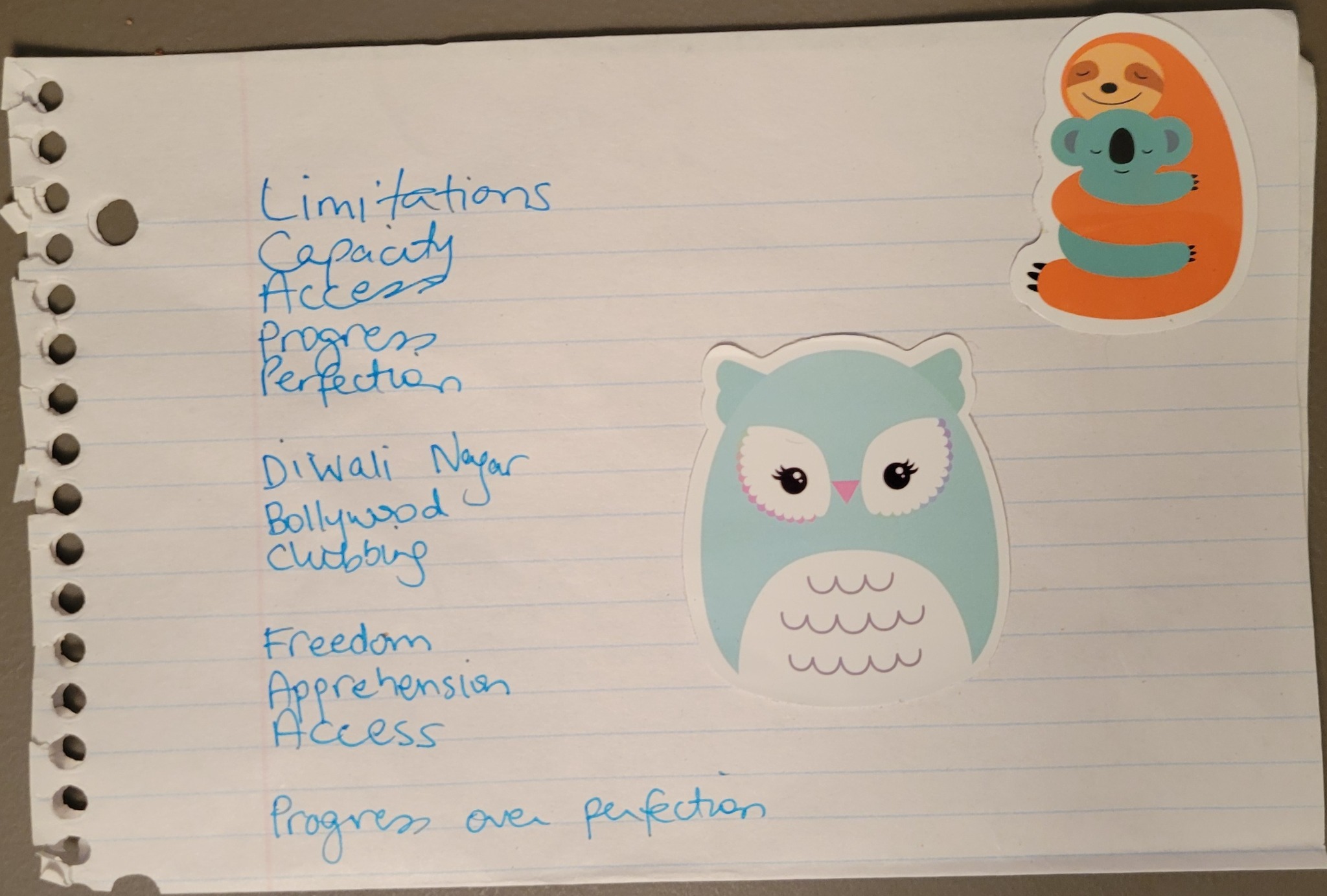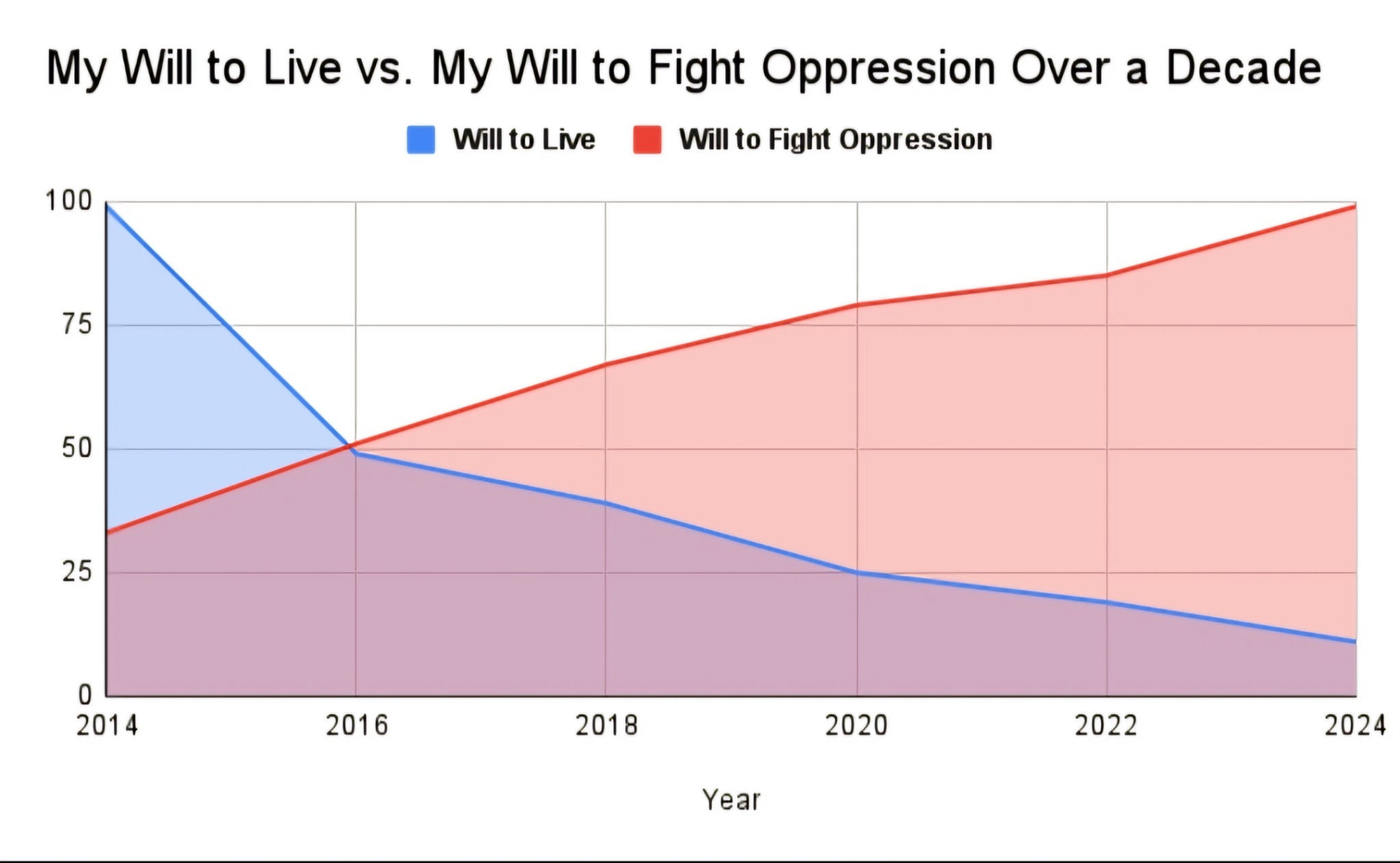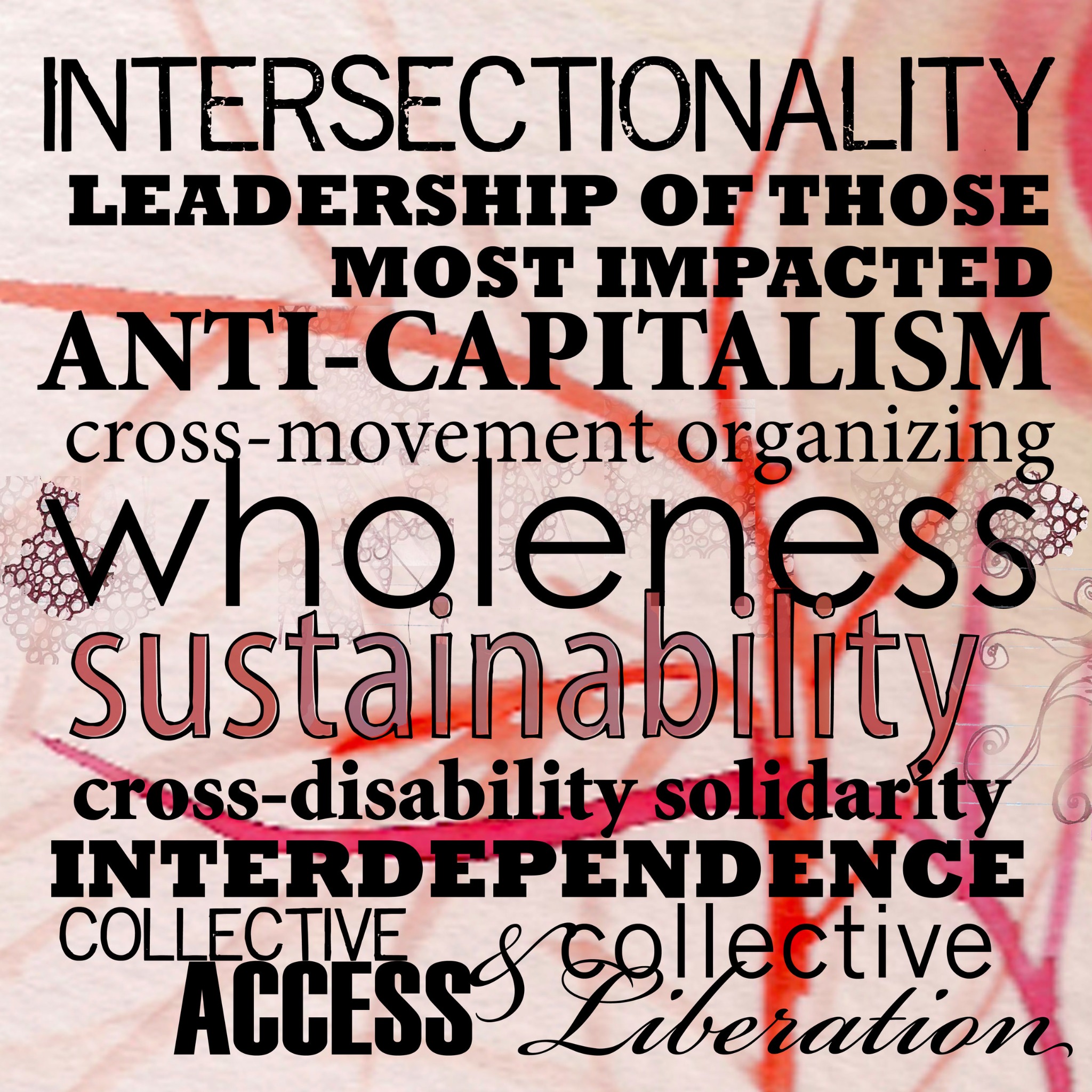This Past Therapist is Retiring All-Or-Nothing Thinking

For a long time, my all-or-nothing mindset drove me to accomplish a great deal despite adversity, but the more disabled I have gotten, that cognitive approach has become a liability, so I have been actively working on retiring that practice, especially as I approach 40.
Earlier this month, that looked like signing up for a free 3-day intensive movement program, only managing to complete the initial session, and spending Days 2 and 3 recovering in an attempt to be functional enough to complete freelance work responsibilities later that week. Especially if we have not spoken openly in the last year of the ongoing pandemic, that disclosure may come as a surprise, as you may still associate me with some of these past experiences:
- Performing Bollywood dancing for a decade back home, including performances at school events, weddings, for the Prime Minister, on television, etc.
- Reading the valedictorian speech at my graduation ceremony from Vistabella Presbyterian School, at which, I was awarded the most accolades for obtaining the highest marks in the most subjects
- Skipping 3 grades upon immigrating from Trinidad
- Starting my 1st hospital job at the age of 16
- Getting 100% on my 1st university Sociology exam
- Writing my 30-page undergraduate thesis in 1 night
- Reading 400+ books by marginalized authors after white supremacy 1st hijacked my therapist career when employed in the medical-industrial complex
- Inspiring Accessibility Services at Canada's largest university to develop a whole ass "equity office" policy on not disparaging the institution on panel discussions, in conference presentations, etc. to silence me at academic events to which I was invited to discuss how white supremacy harms BIPOC students, who made up at least 65% of incoming University of Toronto students before the pandemic
- Resorting to media to illuminate how rigged the academic-industrial complex is against BIPOC LGBTQIA+ disabled folx in my 2020 Huffington Post debut, my memoir essay, "A Slow Death in Academia" published in RADICAL: An Unapologetic Anthology by Women & Gender Non-Conforming Storytellers of Color, April and December 2021 CCF Hub essays, Best Health Magazine essay, Verywell Mind essay, Surviving Academia in this Body digital storytelling clip, University Ableism Bingo zine publication, my essay, "The Wilful Ignorance of Most White Administrators" published in the Big Art Book Issue 7, Scarborough Arts 35th Annual Juried Exhibition: Beloved Community, etc.
I share this because those wins feel like a lifetime ago, given how many more disability-related challenges I now navigate in the aftermath of further white supremacist workplace trauma in the academic-industrial complex until 2021 and the nonprofit-industrial complex until 2023, alongside exploitation in the publishing industry under the guise of allyship from numerous privileged editors whose violations following their publication's performative social media posts encouraging BIPOC, LGBTQIA+, and disabled writers to pitch them after the killing of Mr. George Floyd make me wonder if they ever saw my humanity given how many of them have since discarded me.
Yesterday made 9 years since that awful meeting at the family health team wherein a white social worker (who remains employed!) had the audacity to accuse me of "reverse racism" (which you hopefully know was her gaslighting me!) for bringing in statistics that demonstrated how I was being disproportionately assigned new clients at a higher rate than the white therapists by the white woman who "triaged" new referrals from physicians despite no clinical training (but likely bigotry!) to guide her problematic process! Part of why I remember that incident so vividly is because that terrible meeting felt like such a violation by a white colleague I thought I could trust, only to have other white coworkers utter no statements to back me up! What had made it significantly worse was that the white Human Resources Manager who failed me with her silence in that meeting then had the audacity to come to my office after to privately voice support for me, and envelope me in a hug that was not remotely consensual (which Lifey would later call an "attempt at strangulation" when I vented to her about it!)! After that, I finally felt brave enough to go ahead with my long-time longing to get a pixie cut that evening, on the last day of my 29th year, as it felt as if I had such an epic career battle ahead that the thought of the worst case scenario of potentially hating my new haircut for a bit paled in comparison.

Since recognizing that I have been surviving such insidious white supremacist workplace trauma for at least 9 years, (as I continue to survive the negative impacts of those experiences in exacerbated migraines and sleep issues!) I have been actively trying to partner with my increasingly traumatized disabled bodymind to work through how best to manage my existence when my functioning is not remotely what it was in the past. And there is a great deal of trial and error involved, which gives zero fucks about my aversion to experiential learning unless on my terms! But despite my frustration with this new reality, my disability-related challenges are likely here to stay, so I need to adjust my expectations of both myself and others who have shown me who they are repeatedly, if I hope to have even a bit of quality of life. Especially as we are witnessing ongoing Palestinian genocide that is fueled by white supremacy, colonialism, and capitalism, I cannot help but reflect on how many more folx may benefit from learning, unlearning, and relearning, as I unpack what Disability Justice offers, given how ableism is enabled by these other forms of bigotry, which is why this felt like a meaningful discussion to launch my LURNN newsletter.
In Week 2 of my weekly Pay-What-You-Can arts programming series, Sustainable BIPOC Resistance - Sunday Sessions, we delved into Mia Mingus' concept of Access Intimacy, which has informed my practice for years. Prior to unpacking that I have long been disabled when medical offices shut down in an attempt to flatten the curve in 2020, (which exacerbated back pain, sleep issues, and migraines in those months without access to my trauma-informed chiropractor!) I had tried to embody access intimacy in my willingness to meet folx where they are at, whether engaging with professional clients or loved ones. Over time though, I am beginning to understand how deeply I also need a willingness to work at access intimacy with me from any who care about equity (or me!), because unless folx think critically about oppression, they are likely to further harm me (and exacerbate overwhelming disability-related challenges!) with their quotidian acts of inherently anti-fat colonial white supremacist classist xenophobic ableist queer-antagonistic violence.
This much-needed ongoing journey of understanding and sharing my ever-evolving access needs in the aftermath of extensive white supremacist workplace trauma grounds my commitment to the following 10 Disability Justice principles from Sins Invalid:
1. Intersectionality
We know that each person has multiple identities, and that each identity can be a site of privilege or oppression. The mechanical workings of oppression and how it outputs shift depending upon the characteristics of any given institutional or interpersonal interaction; the very understanding of disability experience itself is being shaped by race, gender, class, gender expression, historical moment, relationship to colonization and more.
2. Leadership Of Those Most Impacted
We know ableism exists in the context of other historical systemic oppressions. We know to truly have liberation we must be led by those who know the most about these systems and how they work.
3. Anti-Capitalist Politic
We are anti-capitalist as the very nature of our mind/bodies often resist conforming to a capitalist “normative” level of production. We don’t believe human worth is dependent on what and how much a person can produce. We critique a concept of “labor” as defined by able-bodied supremacy, white supremacy and gender normativity. We understand capitalism to be a system that promotes private wealth accumulation for some at the expense of others.
4. Cross-Movement Solidarity
Necessarily cross movement, Disability Justice shifts how social justice movements understand disability and contextualize ableism, lending itself toward a united front politic.
5. Recognizing Wholeness
We value our people as they are, for who they are, and understand that people have inherent worth outside of capitalist notions of productivity. Each person is full of history and life experience. Each person has an internal experience composed of their own thoughts, sensations, emotions, sexual fantasies, perceptions, and idiosyncracies. Disabled people are whole people.
6. Sustainability
We pace ourselves, individually and collectively, to be sustained long-term. We value the teachings of our lives and bodies. We understand that our embodied experience is a critical guide and reference pointing us toward justice and liberation.
7. Commitment To Cross-Disability Solidarity
We value and honor the insights and participation of all of our community members. We are committed to breaking down ableist / patriarchal / racist / classed isolation between people with physical impairments, people who identify as “sick”or are chronically ill, “psych” survivors and those who identify as “crazy”, neurodiverse people, people with cognitive impairments, and people who are of a sensory minority, as we understand that isolation ultimately undermines collective liberation.
8. Interdependence
Before the massive colonial project of Western European expansion, we understood the nature of interdependence within our communities. We see the liberation of all living systems and the land as integral to the liberation of our own communities, as we all share one planet. We attempt to meet each other’s needs as we build toward liberation, without always reaching for state solutions which inevitably then extend its control further over our lives.
9. Collective Access
As brown/black and queer crips, we bring flexibility and creative nuance to engage with each other. We create and explore new ways of doing things that go beyond able-bodied/minded normativity. Access needs aren’t shameful — we all have various capacities which function differently in various environments. Access needs can be articulated within a community and met privately or through a collective, depending upon an individual’s needs, desires, and the capacity of the group. We can share responsibility for our access needs, we can ask that our needs be met without compromising our integrity, we can balance autonomy while being in community, we can be unafraid of our vulnerabilities knowing our strengths are respected.
10. Collective Liberation
How do we move together as people with mixed abilities, multiracial, multi-gendered, mixed class, across the orientation spectrum – where no body/mind is left behind?
(Skin, Tooth, and Bone: The Basis of Movement is Our People/A Disability Justice Primer, pages 16-19)

If my first newsletter post resonates with you, please do not hesitate to sign up for LURNN below and follow my work on social media. BIPOC (Black, Indigenous, and people of colour) folx are welcome to attend my 2024 weekly Pay-What-You-Can series, Sustainable BIPOC Resistance - Sunday Sessions, which I hope will bring in enough to fund ASL interpretation services for these workshops in future. And if you could ever use a fat brown queer disabled immigrant woman and past therapist who remains an equity practitioner, I likely still need paid work after being forced into entrepreneurship, (for illuminating the complicity of employers and freelance clients with my oppression in the medical-industrial complex, the academic-industrial complex, the nonprofit-industrial complex, and the publishing sector) so you may purchase my services here and then follow-up at Krystal@equitableforall.com to discuss the logistics of how to proceed with paid work, as I am actively shifting to payment in advance, given that I am still unpaid for nearly $1,000USD from pieces of published writing from the earlier years of the pandemic! 👀
[Please note those who use this email to pitch professionals whose work you or your client believe I should amplify are unlikely to get a reply, but are more unlikely to ever be covered by this writer, who remains an equity practitioner.]
If able to contribute to my survival following my ex's financial abuse of at least $183,364, which further disabled me, alongside white supremacist workplace trauma, e-transfers within "Canada" may be sent to krystaljagoo@gmail.com and funds may be sent via PayPal below, so please consider supporting me! 🙏🏾
BTW, on the off chance that you are looking for a gifted equity practitioner and educator for virtual services like writing, facilitation, and consulting, you are welcome to peruse my CV below, and explore my services here.
Post a comment